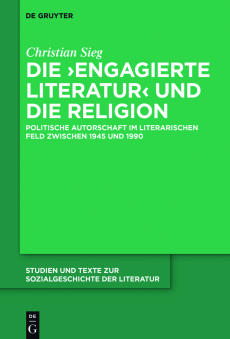Religion in Post-war Literature
Literary scholar Christian Sieg on religion and political authorship

The habilitation thesis of literary scholar Dr. Christian Sieg from WWU’s Cluster of Excellence “Religion and Politics” addresses the function of religion in the staging of political authorship. The monograph “Die ‘engagierte Literatur’ und die Religion. Politische Autorschaft im literarischen Feld zwischen 1945 und 1990” (‘Committed literature’ and religion. Political authorship in the field of literature between 1945 and 1990), as it is titled, was recently published by De Gruyter. “In order to legitimise their literature, ‘committed’ authors resort to socially accepted cultural patterns in their literary texts”, explains PD Dr. Sieg. “To this effect, from the criticism of the Church in the 1950s to the apocalyptic rhetoric of the 1980s, they refer to religious motifs, narratives and discourses in particular.” The scholar analysed post-war literature of distinguished German authors like Heinrich Böll, Arno Schmidt and Günter Grass.
Based on Pierre Bourdieu’s field theory, Christian Sieg develops a literary-sociological notion of authorship in his analysis, illustrating how the staging of authorship ascribes a political function to literature. “The political in post-war literature cannot be understood by listing the discourses in which post-war literature positioned itself politically or by referring to the term ‘commitment’”, says the literary scholar. The political content of the “committed post-war literature” can only be inferred by revealing the role of religion in the staging of authorship. Previously, literary research had only marginally addressed the influence of religion. (dak/maz)

